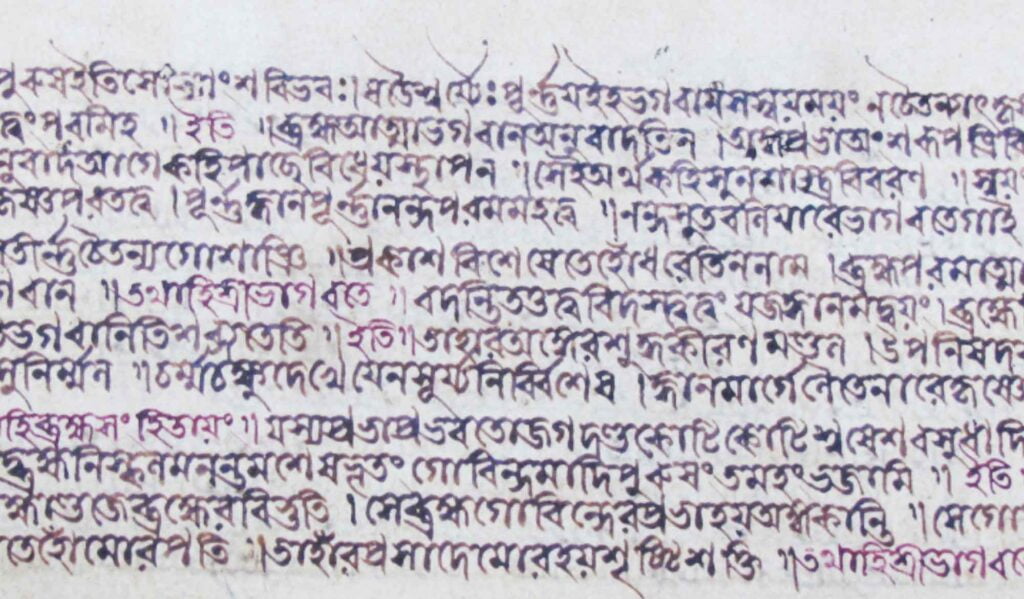Vaiṣṇava Siddhānta Mālā Part 1 – Chapter Three
Tini Akhila Veda-vidyā
(He is Known by All the Vedas)
Question: How can one understand bhagavat-tattva (philosophical truths about the Lord)?
Answer: He can be understood by the jīva’s svataḥ-siddha-jñāna (self-manifest, perfect knowledge).
Question: What is svataḥ-siddha-jñāna?
Answer: There are two types of knowledge – svataḥ-siddha (self-manifest, perfect knowledge) and indriya-paratantra (knowledge which relies upon the senses). Svataḥ-siddha-jñāna is inherently a characteristic of the jīva’s śuddha-caitanya-svarūpa (pure form of consciousness). Just like all spiritual elements, it is eternal. It is known as ‘Veda’ or ‘Āmnāya’. This pure knowledge has descended along with the bound jīva as the Vedas: the Ṛk, Sāma, Yajuḥ and Atharva. This is svataḥ-siddha-jñāna. When common people accumulate mundane knowledge, this is indriya-paratantra.
Question: Can one understand bhagavat-tattva by indriya-paratantra-jñāna or not?
Answer: No. Bhagavān is beyond all mundane senses. For this reason, He is called Adhokṣaja. That which is acquired from the senses, as well as from logic stemming from the mind always remains distant from bhagavat-tattva.
Question: If Bhagavān can be attained through svataḥ-siddha-jñāna, then he is attainable through the svataḥ-siddha-jñāna that I already possess. So what is the necessity of studying the Veda-śāstra?
Answer: The Veda is present within the pure existence of all jīvas in the form of svataḥ-siddha-jñāna.
According to the degree of the jīva’s bondage, that Veda is fully manifest in some, or covered within others. The Vedas descend in a written form in order to stimulate that svataḥ-siddha-jñāna.
Question: We have heard that Bhagavān is perceived through bhakti. If that is so, then how can it be said that He is perceivable through jñāna?
Answer: That which is called jñāna, is another name for bhakti. Some refer to the perception of the Supreme Truth as jñāna, and others refer to it as bhakti.
Question: Then why is jñāna condemned in the bhakti-śāstra?
Answer: The bhakti-śāstra shows respect to svataḥ-siddha-jñāna; without this, the jīva can receive no benefit. It is seen that indriya-paratantra-jñāna and tad-vyatireka-jñāna, (or in other words nirviśeṣa-jñāna*) have both been condemned.
*Impersonal knowledge.
Question: In all the Veda-śāstra, karma (pious activities), jñāna (impersonal knowledge), and bhakti (devotion) – these three are described. Through which of these can one understand bhagavat-tattva?
Answer: If one looks at all the statements of the Vedas, it is seen that there is nothing else worth knowing apart from Bhagavān.
All Vedic karma ultimately leads to Bhagavān. Jñāna, in its purest state, free from the dualities of enjoyment and renunciation, also has Bhagavān as its objective. Bhakti is inherently natural and refers to the cultivation of service to Bhagavān. Thus, He is to be known by the knowledge of the Vedas.









